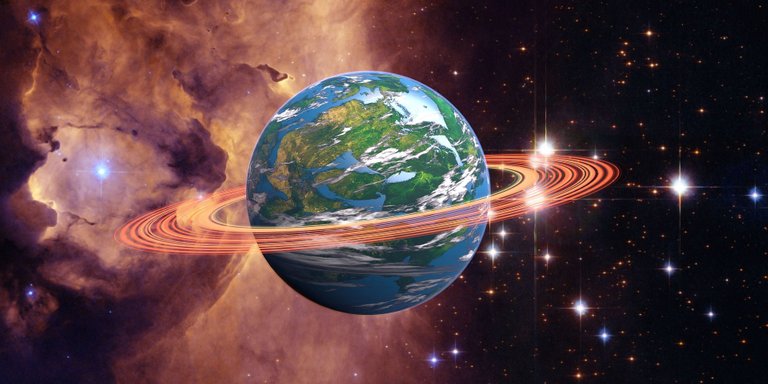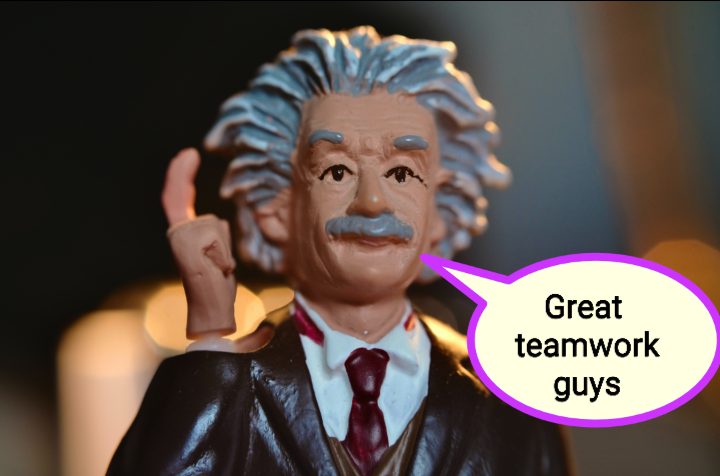It's been a while folks - my apparent absence from this platform, hope you didn't miss me much. Well, it wasn't totally my fault, problems lingering here and there but I'm back and ready to roll.
So, who is ready to get his/her mind blown ?
Let's get on with it.
We all must be familiar with gravity - that force that tries to marry us with the surface of our planet (Earth) when we are not married to it (our planet's surface), but we may not be very familiar with the mechanism/true workings of how gravity actually operates and where it comes from. No need to worry, as even physicists are still having a hard time trying to understand gravity too.
Wait a minute, " I thought Einstein had it all figured out ". 🤔 Emmmm.... Not really. As a matter of fact, Einstein shortly before his death became skeptical of his theories, the very same theories he's been celebrated for today, including general relativity. His words in a personal letter to professor Solovine in the year 1949, were and i quote
You can imagine that I look back on my life’s work with calm satisfaction. But from nearby it looks quite different. There is not a single concept of which I am convinced that it will stand firm, and I feel uncertain whether I am in general on the right track.
This skepticism was triggered by quantum mechanics, and his quest for a unified theory of general relativity (gravity) and Maxwell's equations (electromagnetism) - an eventual failed attempt.
However, the quest for understanding gravity started neither today, Einstein's time nor in Newton's time, it started a very long time ago, probably since antiquity. But the earliest known record was that of the ancient Greeks and ever since, there has been proposals upon proposals as to the best way to understand gravity. A major breakthrough which in modern times is considered the earliest paradigm shift in science began in the 17th century with the works of Sir Issac Newton, he developed a theory of gravity that matched experimental findings of his time and before his time, this theory also predicted stuffs never observed before which were later confirmed experimentally/observationally, an example being the planet "Neptune". This theory would go on to last for over 200 years before the next paradigm shift in gravitational physics took place - Einstein's theory of general relativity.
Before the inception of general relativity, there were physical problems that Newton's theory couldn't account for, an example being the perihelion precession anomaly of the planet "Mercury". There were several attempts by physicists before and during Einstein's time to resolve this discrepancy, including trying to reformulate Newton's theory of gravity but they were unsuccessful - from a general perspective.
This discrepancy would later be resolved by Einstein with his theory of general relativity, this new gravitational theory also predicted mind-bending stuffs that would later be confirmed experimentally. Historically, after Einstein had produced and published his theory of special relativity (basis for the development of general relativity), it took Einstein 8 years (1907 - 1915) to develop general relativity of which he didn't do alone. He had the help of very intelligent people (especially his close friends Besso and Grossmann), these people were smart enough to be considered the greatest of their generation. Had it not being for these people, it could have taken Einstein (alone) more than 8 years to develop. However, it took another extra 60 years (1915 - 1975) for the theory to enter mainstream physics. In total, it took a total of about 68 years for general relativity to reach full development and acceptance.
It is interesting to note that the theories of gravity from Newton's time down to Einstein's time makes up what is today referred to as the "classical theory of gravity" and it took a total of over 300 years to develop. For comparison and to show how difficult understanding gravity was, the "classical theory of electromagnetism" (another fundamental force and rival to gravity) took less than 100 years to be fully developed and accepted.
Despite the number of years and intellectual efforts involved in trying to understand gravity, we still even to this day haven't figured out the true nature of gravity, including classically. At cosmological scale where general relativity is supposed to be very applicable, there still are problems it can't resolve with great satisfaction. Cosmological phenomena requiring yet "undetectable" entities such as "dark matter" and "dark energy" for explanation indicates that a better theory of gravity maybe required. As matter of fact, the theory of general relativity is apparently well tested at the scale of solar systems, beyond the solar system it is not well tested, most claims are actually speculations based on indirect evidences, do not be fooled.
Another difficulty (a big one for that matter) with understanding gravity, is understanding it at the atomic/subatomic scale. It is currently believed that at such scales quantum physics rules and therefore we should expect a quantum theory of gravity not a classical one. Also assuming the big bang model of our universe's origin is actually very true, a quantum theory of gravity is also needed because at some time in the past, the universe was so small, comparable to the atomic/subatomic scale or even smaller. This line of thinking has prompted physicists to believe that the next paradigm shift in gravitational physics is a quantum theory of gravity.
However, despite efforts trying to develop such a theory (quantum theory of gravity), it still remains very elusive and it's mainly due to the following issues
Mathematical inconsistencies
Untestable predictions
Difficulty experimenting with gravity at such scale due to it's relative weakness - it's the weakest of all fundamental forces
Note that other fundamental forces already have their quantum theories and their generalised framework - quantum field theory, being the basis for the standard model of particle physics, gravity is yet to be included in this standard model.
So, are we saying that for over 400 years and still counting we still don't really understand gravity ?
Honestly folks, that is what it all seems, this is very disappointing and at the same time amazing. As of today, there are many different theoretical proposals with regards to understanding the true nature of gravity both classical and quantum, and research is still ongoing. This tells you how very elusive gravity actually is. As a matter of fact, gravity appears to be the most difficult fundamental force to grasp and no wonder if there happens to be a successful paradigm shift in gravitational physics, the main people involved are always considered "the greatest thinkers" of all time e.g Newton and Einstein.
This however should not stop us from searching, hopefully one day, this gravity mystery would be resolved and may lead to technological possibilities through being able to control/manipulate gravity. Just in case you didn't know, general relativity has very little technological applications compared to that of Newton's, most technological applications of gravity still makes use of Newton's theory. Non of these theories on the other hand has brought us to the point of being able to control gravity, this however is if gravity can ever be controlled. But until we have a complete, consistent and true understanding of gravity we can then decide if gravity is controllable or not.
It's here we conclude this article, have a thoughtful day and see you next time.
For further reading
History of gravitational theory
B. Hoffman, Albert Einstein-Creator and Rebel (N.Y.: Viking Press, 1972).
Thank you all once again for stopping by to read my jargons and also thank you @juecoree, @lemouth and the @Steemstem team for your valuable supports.
Lastly, please don't forget to do the needful
Upvote
Comment
Reblog
If you enjoyed my jargons.



Yay! 🤗
Your content has been boosted with Ecency Points, by @clinton19.
Use Ecency daily to boost your growth on platform!
Support Ecency
Vote for new Proposal
Delegate HP and earn more
Thanks for your contribution to the STEMsocial community. Feel free to join us on discord to get to know the rest of us!
Please consider delegating to the @stemsocial account (85% of the curation rewards are returned).
You may also include @stemsocial as a beneficiary of the rewards of this post to get a stronger support.
Thanks a lot for this great article, that I have only read today. I was quite busy too and didn't have much time to engage others. I am however fixing this, little by little.
Here are three comments that I wrote while reading your blog.
And even more than 68 years, if we account for the experimental confirmation of all its predictions. I am thinking in particular to gravitational waves.
This is indeed something that is not emphasised enough. In the early universe, both quantum and gravity effects are needed, and we don’t know how to deal with the, together. This challenges a lot of things.
I truly hope to still be alive when this will happen!
Have a nice week-end! Cheers!
Yes, that. It skipped my mind.
Or perhaps we may be on the wrong track.
Me too.
I am not even sure we are presently on any track ;)
Cheers!